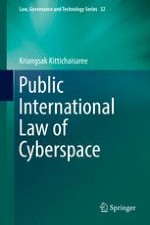2017 | OriginalPaper | Buchkapitel
6. Cyber Espionage
verfasst von : Kriangsak Kittichaisaree
Erschienen in: Public International Law of Cyberspace
Aktivieren Sie unsere intelligente Suche, um passende Fachinhalte oder Patente zu finden.
Wählen Sie Textabschnitte aus um mit Künstlicher Intelligenz passenden Patente zu finden. powered by
Markieren Sie Textabschnitte, um KI-gestützt weitere passende Inhalte zu finden. powered by
